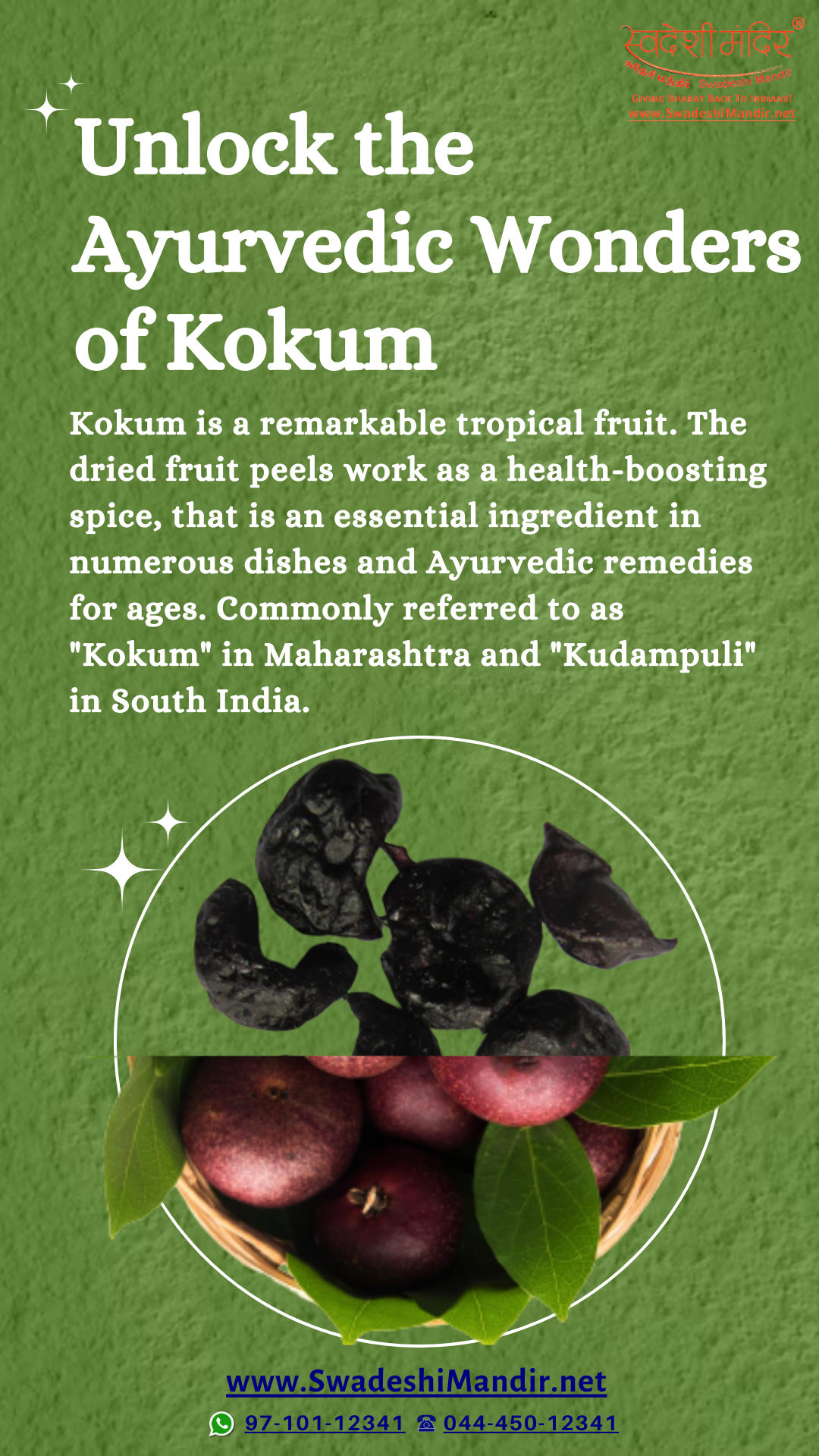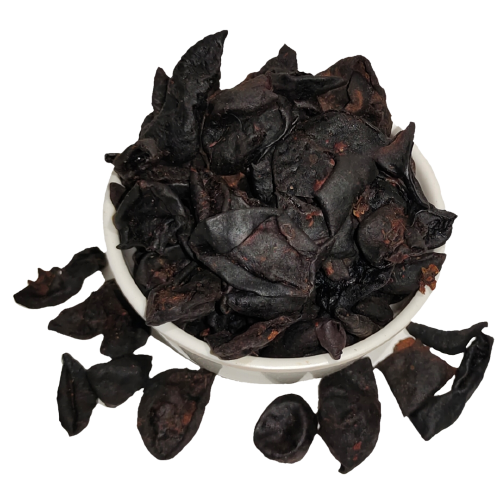Blog: All about Kokum. Kokum vs. Tamarind: The Healthier Ayurvedic Choice.
Blog: All about Kokum. Kokum vs. Tamarind: The Healthier Ayurvedic Choice. Discover Kokum's Ayurvedic wisdom. Why choose Kokum over tamarind? Explore its cooling, digestive & health-enhancing benefits. Learn how to make Kokum juice!
Introduction
Here are the myriad benefits of Kokum (also known as Garcinia indica) according to Ayurveda. This exotic fruit, native to India, has long been celebrated for its remarkable health-promoting properties. In this blog, we will delve into the Ayurvedic perspective on Kokum, comparing it to its popular counterpart, tamarind, and addressing common questions about this mystical fruit. Let's embark on this enlightening journey!
| Table of Contents
1. What is Kokum Called in India? |
1. What is Kokum Called in India?
In India, Kokum goes by various names depending on the region. It is commonly referred to as "Kokum" in Maharashtra and "Kudampuli" in Kerala. This tropical fruit has a rich history in Indian cuisine and traditional medicine, making it an essential ingredient in numerous dishes and Ayurvedic remedies.
2. The Ayurvedic Perspective on Kokum
Ayurveda, the ancient Indian system of medicine, recognizes Kokum as a valuable natural resource. Kokum is believed to possess cooling (Pitta-pacifying) properties, which are highly esteemed in Ayurveda for maintaining balance within the body.
Kokum is predominantly used to alleviate digestive issues, acidity, and heat-related disorders. It is revered for its ability to promote digestion, reduce inflammation, and enhance appetite.
3. Kokum vs. Tamarind: The Superior Choice
|
Aspect |
Kokum |
Tamarind |
|
Cooling Properties |
Kokum possesses cooling properties, making it ideal for balancing Pitta dosha. |
Tamarind is heating in nature, which can exacerbate Pitta imbalances. |
|
Digestive Benefits |
Promotes digestion and alleviates acidity. |
May sometimes cause acidity and heartburn due to its heating nature. |
|
Appetite Enhancement |
Known to enhance appetite. |
May not have the same appetite-boosting effect. |
|
Anti-Inflammatory |
Exhibits anti-inflammatory properties. |
Contains some anti-inflammatory compounds but less than Kokum. |
|
Antioxidant Content |
Rich in antioxidants, supporting overall health. |
Contains antioxidants but in lower quantities compared to Kokum. |
|
Weight Management |
Can support weight management due to its digestive benefits. |
May not have the same impact on weight management. |
|
Culinary Versatility |
Used in various culinary creations, including beverages, pickles, candies, and syrups. |
Frequently used in cooking but may not have the same versatility as Kokum. |
|
Ayurvedic Preference |
Preferred in Ayurveda for its cooling properties and digestive benefits. |
May be less favored in Ayurveda due to its heating nature. |
In summary, Kokum's cooling properties, digestive benefits, and suitability for Ayurvedic practices make it the superior choice over tamarind, especially for those seeking holistic health and balance according to Ayurvedic principles.
While tamarind has its merits, Kokum often surpasses it in Ayurvedic applications due to its cooling nature. Tamarind, on the other hand, is considered heating (Pitta-aggravating) and may not be suitable for individuals with a Pitta constitution or those experiencing excessive heat in the body.
Kokum's cooling properties make it a preferred choice for balancing Pitta dosha, aiding digestion, and soothing gastrointestinal discomfort.
4. Is it Good to Drink Kokum Daily?
Yes, incorporating Kokum into your daily routine can be beneficial, especially if you have a Pitta constitution or are experiencing digestive issues. Drinking Kokum juice or consuming Kokum-based products in moderation can help maintain digestive health and balance Pitta dosha.
5. Is Kokum Good for Health?
Absolutely! Kokum offers an array of health benefits, including:
- Improved digestion
- Relief from acidity and heartburn
- Enhanced appetite
- Anti-inflammatory properties
- Antioxidant-rich content
- Support for weight management
- Cooling effect on the body
6. Is Kokum Good for the Liver?
Yes, Kokum can be beneficial for liver health. Its detoxifying properties, combined with its ability to support digestion and reduce inflammation, indirectly contribute to liver well-being. However, it's essential to consult with an Ayurvedic practitioner for specific liver-related concerns.
7. Different Edible Kokum Products
Explore the diverse range of edible Kokum products available at Swadeshi Mandir (https://swadeshimandir.net/search?keyword=kokum):
- Kokum Soal: Dry Rinds for Cooking
- Kokum Concentrate: Prepared from Rinds For Cooking Dal, Rasam etc.
- Kokum Sherbat: Sweet concoction for diluting with water.
- Sweet Kokum Jeera SherbatKokum Jeera Sherbat: Sweet concoction with Jeera for diluting with water.
8. Disclaimer: Consult a Qualified Ayurvedic Practitioner for your health issues
Kokum is a remarkable fruit with numerous health benefits. This blog/story/reel/any content published is not intended to diagnose/prevent/cure/treat any health issues. It’s just an information sharing sourced from various public sources. It's essential to consult a qualified Ayurvedic practitioner to take care of your chronic health issues. They can provide personalized guidance based on your unique constitution and health concerns.
9. Get Your Kokum Supply Today!
Discover the wonders of Kokum and its Ayurvedic benefits by obtaining high-quality Kokum products from [Swadeshi Mandir] (https://swadeshimandir.net/search?keyword=kokum).
Start your journey toward improved digestion and overall well-being with this ancient Ayurvedic gem!
10. Making Kokum Juice
a) From Fresh Kokum Fruit
Ingredients:
- Fresh Kokum fruits (about 10-12)
- Sugar or jaggery to taste
- Water
Instructions:
- Wash and halve the Kokum fruits.
- Remove the seeds and place the fruit in a bowl.
- Add a cup of water and let it soak for a few hours or overnight.
- Mash the soaked Kokum to extract the pulp.
- Strain the pulp to remove any solids.
- Add sugar or jaggery to taste and mix well.
- Dilute with water, adjust sweetness, and serve chilled.
b) Creating Kokum Juice from Dry Kokum
Ingredients:
- Dry Kokum (about 20-25 pieces)
- Sugar or jaggery to taste
- Water
Instructions:
- Soak the dry Kokum in warm water for 2-3 hours.
- Mash the soaked Kokum to make a thick paste.
- Strain the paste to collect the Kokum concentrate.
- Add sugar or jaggery to taste and mix well.
- Dilute with water, adjust sweetness, and serve chilled.
c) Preparing Kokum Sherbat
Kokum sherbat is a convenient option, as it comes in pre-packaged form. Simply dilute it with water as per the instructions on the package and enjoy.
FAQs about Kokum Juice
Q: Can I store Kokum concentrate?
A: Yes, you can refrigerate Kokum concentrate for future use.
Q: Is Kokum Juice suitable for all ages? A: Yes, Kokum Juice is safe for children and adults. However, consult a doctor for infants.
In conclusion, Kokum, known as "Kudampuli" in Kerala and "Kokum" in Maharashtra, is a treasure trove of Ayurvedic benefits. Its cooling properties, digestive prowess, and versatility in various culinary creations make it a prized fruit in traditional Indian medicine and cuisine. Embrace the healing power of Kokum and experience the positive impact it can have on your health and well-being. Remember to consult an Ayurvedic expert for personalized guidance, and enjoy the benefits of Kokum in moderation for a balanced and healthy life.







